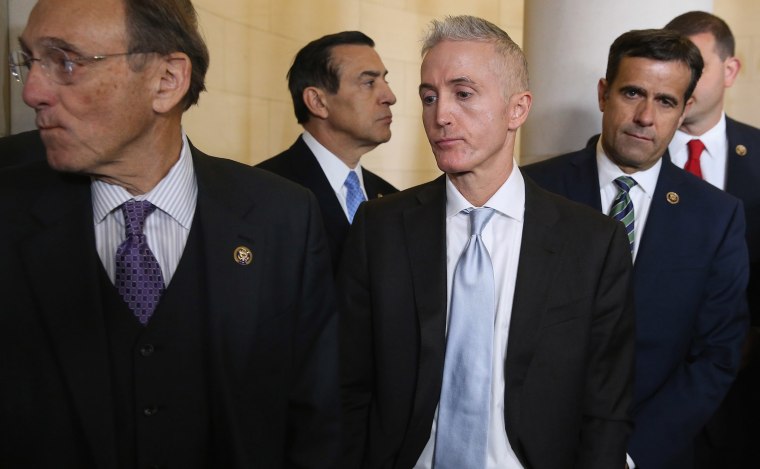When House Republicans created the Select Committee on Benghazi two years ago, tasking the panel to investigate a deadly attack that had already been thoroughly investigated by other committees, GOP activists, conspiracy theorists, pundits, and election staffers had high hopes of what Rep. Trey Gowdy's (R-S.C.) committee could accomplish.
That was quite a while ago. More than two years and $7 million later, the Republicans' Benghazi panel has wrapped up the longest congressional investigation in the history of the United States, and it couldn't avoid this lede in the New York Times.
Ending one of the longest, costliest and most bitterly partisan congressional investigations in history, the House Select Committee on Benghazi issued its final report on Tuesday, finding no new evidence of culpability or wrongdoing by Hillary Clinton in the 2012 attacks in Libya that left four Americans dead.
The full report, which is over 800 pages long, is online here. By all accounts, the GOP members of the panel raised a variety of criticisms and concerns, including inadequate security resources in Libya, bureaucratic inertia, and breakdowns in coordination between agencies.
Or put another way, the Select Committee on Benghazi came to the same conclusions all of the other investigations reached quite a while ago, raising questions anew about why in the world this committee was necessary in the first place.
As regular readers know, some congressional Republicans admitted the panel was a partisan exercise, which was created and sustained for purely political reasons. Committee Democrats, who released their own 339-page report yesterday, said in a press statement, "Decades in the future, historians will look back on this investigation as a case study in how not to conduct a credible investigation."
The evidence to bolster the point is overwhelming. Given the panel's abuses, the inescapable fact is clear: the Republicans' Benghazi Committee didn't investigate a scandal; the Republicans' Benghazi Committee was the scandal.
It's obviously unrealistic to believe the Republican scandal-mongers who've thrown all kinds of ugly accusations at President Obama and Hillary Clinton will apologize now, but I am genuinely curious about how they'll deal with the cognitive dissonance. On the one hand, the right has already convinced itself that administration officials are guilty of horrific wrongdoing. On the other hand, every Republican committee -- including the one created for the purpose of digging up dirt in time for the 2016 election -- has failed to find evidence to bolster the conspiracy theories.
So, are we to believe the conspiracy theories are wrong or that Trey Gowdy and his GOP allies are somehow in on an elaborate cover-up?
Perhaps the more salient question is more straightforward: why in the world did House Republicans spend two years and $7 million to effectively exonerate Hillary Clinton as part of the GOP's favorite conspiracy theory?
While conservatives ponder that, let's reiterate an important angle to all of this: I've long found the Republicans' Benghazi Committee to be ridiculous, but I'm not suggesting the deadly terrorist attack in Libya, which left four Americans dead, was unworthy of investigation. Just the opposite is true -- Congress had a responsibility to determine what happened and take steps to prevent similar attacks in the future.
But therein lies the point: seven separate congressional committees investigated the Benghazi attack before the Select Committee was even created. This was already one of the most scrutinized events in American history. Republican lawmakers, however, didn't quite care for what the evidence told them, so they effectively concluded, "Seven committees didn't tell us what we wanted to hear, so maybe the eighth committee will."
Except, it appears this one came up short, too.
The Select Committee on Benghazi lasted longer than the investigations into the federal response to Hurricane Katrina, the attack on Pearl Harbor, the assassination of President Kennedy, the Iran-Contra scandal, Church Committee, the Watergate probe, and the 9/11 attacks. In fact, it's of interest that the 9/11 Commission, investigating every possible angle to the worst terrorist attack in the history of the country, worked for 604 days and created a bipartisan report endorsed by each of the commission's members.
The Benghazi committee, meanwhile, worked for over 700 days to create a partisan, election-year document, rehashing revelations that have been known and documented for years.
History will not be kind.
